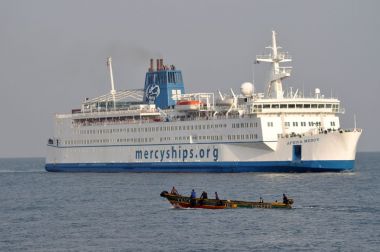Ebola outbreak: Christian hospital Mercy Ships cancels trip due to risk

The travelling Christian hospital Mercy Ships has had to cancel a trip to care for people in Africa due to the Ebola outbreak that is wreaking havoc in the region.
The ship has been halted in a planned trip to Benin and is docked and waiting in the Canary Islands while the situation is assessed, and may have to postpone its work in West Africa until the risk reduces. Mercy Ships said that it is not equipped to treat people during viral epidemics, when the risk of infecting other patients and medical staff is high. It said in a statement that it "has delayed that sail pending further assessment due to the virulence of the outbreak in neighboring Nigeria."
In total, thousands of cases of Ebola have been reported in Liberia, Sierra Leone, Nigeria and Guinea. Some doctors and aid workers have been infected as they work with the sick, and medical facilities are being overwhelmed. The disease is untreatable, though about half of the patients in the current outbreak are recovering. Some flights to the affected countries have been stopped due to the risk of spreading the virus.
Mercy Ships is kitted out for surgery and other routine healthcare needs to take people onboard for treatment as it docks in a country's port. However during an infectious epidemic, a special set up is required. "Multi-bed wards and limited isolation facilities, close proximity to crew accommodation and dining for families and children are but a few restraints," said founder Don Stephens in a statement.
The ship is currently docked in the Canary Islands while a long-term decision is made. It also cancelled a trip to Guinea in April following the Ebola outbreak there last December.
Stephens asked the Christian community for prayer. "Africa is and remains our priority, but crew safety drives every decision," he emphasized. "We request prayer as we consider all options to manage the risk, including deployment to other unaffected nations."
Mercy Ships has been working for over 25 years to give surgery and healthcare to countries that do not have good access to such services. It says it has worked more than 70 countries providing services valued at more than $1 billion, treating more than 2.43 million direct beneficiaries.











